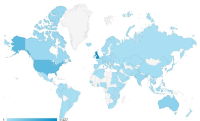Ghosting & Peer Review
Writing about web page https://exchanges.warwick.ac.uk/peerreviewer
This summer if you happened to be listening to one of my talks about the importance of peer review, and the associated challenges around it, you’ll have probably heard me mention the biggest issue for me as a journal editor-in-chief: ghosting peer reviewers. A suitable topic for a Halloween post, I thought.
When we initially locate and approach prospective peer reviewers for Exchanges, part of the subsequent discussion is making them aware of the timescale within which we’d expect them to be able to complete the review. We’ve a nominal month set as standard for a review turnaround, as we’ve found that seems to have suited most of our reviewers and authors over the years. However, peer reviewing is not a time trivial task for anyone to take on, for example with have a a guestimate that it will take at least 5 hours to peer review a single Exchanges article. Other titles can put the anticipated commitment even higher still. This is one of the reasons why the COPE ethical guidelines for peer reviewers state, individuals should ‘only agree to review manuscripts for which they have the subject expertise required to carry out a proper assessment and which they can assess in a timely manner’ [1]. Unsurprisingly, this time commitment is why some reviewers we approach, decline to participate.
Nevertheless, from the outset there’s an expectation on reviewers once they’ve agreed to conduct a review that they’ll carry it out. Naturally, as an editor it is important to understand how real life can get in the way, with peoples’ circumstances liable to change without prior warning. That’s why you have to ensure there’s an accommodation for individuals who suddenly need a little more time to conduct the review or who might need to drop out altogether. This is quite understandable, and as a journal we have our share of reviewers who have to drop out.
For us though, a problem arises when reviewers run silent, deep and dark. Typically, we spot this when they pass the review deadline without producing their review, and yet also stop responding to messages from the Editorial Board. There’s a tricky balancing act here for my team, we don’t want to bombard tardy reviewers with too many communications least we risk wreaking our relationship with them. Yet, reviewers have made a commitment to contribute to our quality assurance processes that we’d ideally like to see honoured. To borrow a term from the dating sphere, being ghosted, ‘The act of suddenly ceasing all communication with someone’ [2] has never represented a favourable turn of events, in either life or journal communications. Certainly, being ghosted as an editor can be a deeply frustrating experience. Even more so, the delays it creates in the editorial workflow present a bugbear for our authors, who end up waiting far longer than they’d reasonably expect to receive feedback or a decision on their work.
You might think being ghosted by reviewers was a rare occurrence, and yet over my 6 months as editor I’ve lost count of the number of times I’ve spotted one or more of my editors having to deal with it. On some submissions it’s been known to happen multiple times. While, as I said, I can appreciate life is rarely straight forward, I retain an optimistic view that scholars would have the requisite professionalism to let me know if suddenly being a reviewer is no longer a task they can satisfy. I’m never offended by a big, bold and honest ‘No, I can’t do this anymore’, as it is far better to know for certain than be left in the dark. Yet, sadly, I have no easy solution to reviewers who choose to start ghosting the editorial team. Beyond that is, taking reviewers who fail to respond off our call sheets for future assignments, albeit a move I’m loathed to take, given the diversity and spread of our reviewers’ pool importance to myself and the title.
With this in mind, I was interested to read today about technological solutions for ghosting [3]. OJS, the platform we run Exchanges on, does have the ability to send automatic and manual prompts to reviewers [4], but perhaps we’ve not been using these as systematically as we could. Perhaps too, we could think again about how and when we send out reminders to reviewers. I’m not sure I have any immediate solutions to the issue, but it is one that’s going to occupy me for some time to come, long after the last pumpkin has been consigned to the compost heap!
[1] Hames, I., 2013. COPE Ethical Guidelines for Peer Reviewers. Committee on Publication Ethics. https://publicationethics.org/files/Peer%20review%20guidelines.pdf
[2]: Illa, G., 2013. Ghosting. Urban Dictionary. https://www.urbandictionary.com/define.php?term=Ghosting
[3] Hern, A., 2018. Ghosting Busters: why tech companies are trying to stop us blanking each other. Guardian, 31 October. https://www.theguardian.com/lifeandstyle/2018/oct/31/ghosting-busters-why-tech-companies-trying-stop-blanking-each-other
[4] And authors too – authors ghosting us is also a problem
 Gareth Johnson
Gareth Johnson

 Please wait - comments are loading
Please wait - comments are loading



 Loading…
Loading…

